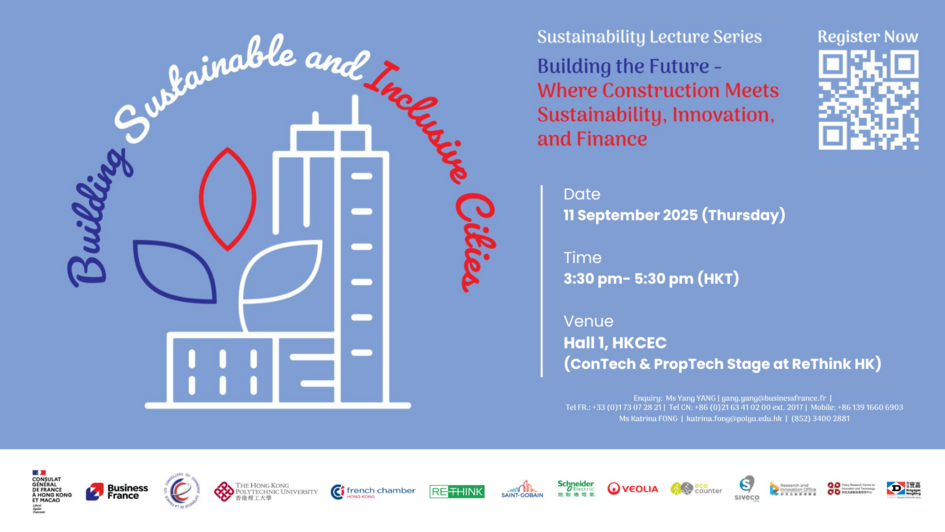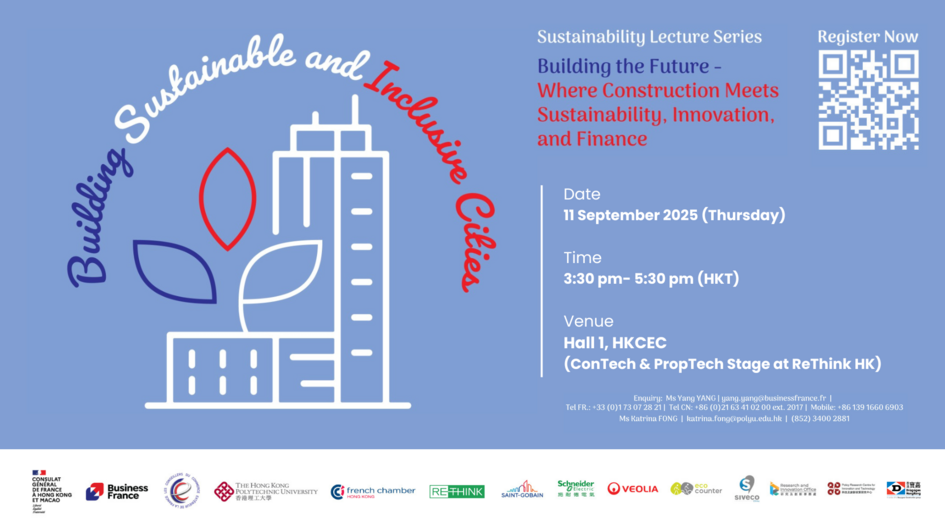
6th edition of the Sustainablility Lecture Series

Green construction plays an essential role in the transition to a sustainable future. By adopting architectural practices consistent with sustainable development, we can reduce our carbon footprint and minimize our impact on natural resources. Green building design is based on several key principles that help reduce environmental impact and maximize resource efficiency.
At the time of its bid to host the Paris 2024 Olympic and Paralympic Games, France pledged to halve the Games' carbon footprint compared with previous editions. To achieve this goal, the use of wood has become a must. Wood is by nature a material that captures carbon from the atmosphere, and is renewable. Its use in buildings reduces greenhouse gas emissions over their entire lifecycle, and stores carbon over the long term. The Olympic Village, the Porte de la Chapelle Arena, the ephemeral Grand Palais, the Olympic Aquatic Center etc. These emblematic buildings, erected for the Games, all feature wood. The French government wanted the wooden buildings to be used not just for the Games, but for the long term. They were designed to be reversible, meaning that at the end of the Games, the Olympic Village were transformed into residential housing and offices. For the Olympic swimming pool, the wooden elements were prefabricated by a Bas-Rhin company supported by the French government as part of the "Industrialization of wood products and construction systems" call for projects under the France 2030 budget.
SOLIDEO's missions were to work on the legacy of the Paris Games with the delivery to the inhabitants of the Olympic and Paralympic sites as part of a sustainable urban project, in close cooperation with local authorities including the realization of reversibility works in the housing of the Village des Athlètes, but also the adaptation of public facilities so that they can be used by sports clubs, associations and communities, as well as the realization of complementary works and necessary to the heritage, such as the Ampère park in Saint-Denis, the Saint-Denis school group or the Dugny school group.
Co-organised by the Consulate General of France in Hong Kong and Macau, and the Research Innovation Office (RIO) of The Hong Kong Polytechnic University, the sixth edition of the Sustainability Lecture Series will bring together a mix of speakers from the academic and business communities to share their views, experiences and good practices towards sustainability.
Speakers
|
Professor CS Poon |
|
Head of the Department of Civil and Environmental Engineering, Director of the Research Centre on Resource Engineering for Carbon Neutrality, Hong Kong Polytechnic University. He also serves as Director of the Research Centre for Resources Engineering towards Carbon Neutrality and is a Distinguished Research Professor. His research focuses on low-carbon construction materials, sustainable construction, and waste recycling technologies, with over 350 journal publications to his name. A Fellow of the Hong Kong Institution of Engineers and the Hong Kong Concrete Institute, he has also served on key advisory bodies including Hong Kong’s Advisory Council on the Environment and the Council for Sustainable Development. |
|
Titre du contenu |
|
Associate Professor in the Department of Building and Real Estate at The Hong Kong Polytechnic University. He holds a PhD in Real Estate Finance from The University of Hong Kong, as well as a bachelor’s degree in Land Management and a master’s degree in Finance from Renmin University of China. A certified Financial Risk Manager (FRM) and Chartered Financial Analyst (CFA), he has also been a visiting scholar at the University of Connecticut and previously taught at The Hang Seng University of Hong Kong and PolyU’s School of Accounting and Finance. His research focuses on real estate, urban studies, ESG, green finance, and climate finance |
|
Professor Joël Idt |
|
Professor at Université Gustave Eiffel and a member of Lab’Urba, specialist in urban governance and large-scale urban projects. His research explores the intersection of public policy, urban development, and socio-political dynamics, with a particular interest in how mega-projects shape urban transformation. At the École d’Urbanisme de Paris, he teaches urban planning and the sociology of public action. Furthermore, Professor Joël IDT has been involved in the Paris 2024 Olympic Games as a researcher embedded within SOLIDEO since 2020, as part of the Coubertin research-action programme. His work focused on the delivery of the Athletes’ Village, particularly the coordination of planning timelines, institutional rhythms, and the long-term legacy of Olympic infrastructures. |
|
Pascaline Hayoun |
|
She joined the Saint-Gobain Group in 2013 and has held various roles in R&D, innovation, manufacturing, and sustainability across France, the United States, and global operations. Since January 2024 as the CEO of Saint-Gobain Hong Kong & Macau.Before her current position, she was Director of Strategy & Sustainability at Saint-Gobain Surface Solutions, where she drove initiatives in decarbonisation and sustainable construction. In Hong Kong and Macau, she leads efforts to promote environmentally responsible building practices, in line with the Group’s ambition to achieve net-zero emissions by 2050. |
|
Bruno Lhopiteau |
|
Founder and Managing Director of Siveco China, which he established in 2004 as a leading maintenance consultancy and pioneer in Smart Operation & Maintenance technologies, including the award-winning bluebee® suite. With over two decades of experience in China’s infrastructure and industrial maintenance sectors, he has successfully led high-tech operations, R&D activities, and international expansion across Asia, the Middle East, and Africa, particularly on Belt & Road projects. A recognized industry expert, he is a frequent speaker at professional events, a columnist in specialized publications, and a lecturer on Industrial Risk Management at Shanghai University. |
|
Michel Li Jun |
|
He is General Manager of Eco-Counter Hong Kong, where he oversees operations and strategic initiatives to promote the company’s advanced pedestrian and cycling counting technologies. His work focuses on deploying solutions such as Eco-DISPLAY and integrated data platforms to support active transportation planning, trail monitoring, and sustainable urban mobility projects across Hong Kong. By enabling data-driven decision-making, he contributes to creating greener, more walkable, and bike-friendly cities in the region. |
Join us for an engaging discussion featuring key experts, including researchers from the Hong Kong Polytechnic University, a special guest from Université Gustave Eiffel, and representatives from leading French companies in sustainability such as Schneider Electric, Saint-Gobain, Veolia, and others who are making significant contributions to this field. This event offers a unique opportunity to network with industry leaders, engage in meaningful discussions, and discover innovative solutions that can shape a more sustainable future.
Event Details
Date: 11 September 2025 (Thursday)
Time: 3:30 pm - 5:45 pm
Venue: Hall 1, HKCEC, (ConTech & PropTech Stage at ReThink HK)












No comment
Log in to post comment. Log in.